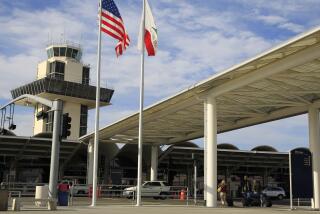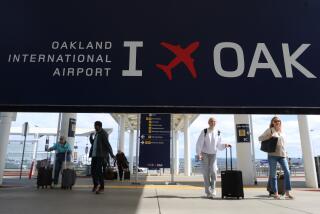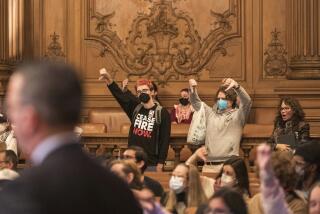S.F. Agrees to Be Home for Battleship Missouri
SAN FRANCISCO — The Board of Supervisors Monday narrowly approved an agreement to base the battleship Missouri, plus nine or ten support ships, here after winning a pledge that the Navy would not discriminate against gays in hiring a civilian work force.
In casting the 6-5 vote, after more than two years of negotiations, San Francisco became the last of nine cities to approve its part in a Reagan Administration plan to spread the Navy fleet beyond its traditional bases of San Diego and Norfolk, Va.
Rear Adm. Robert L. Toney said he was “thrilled” by the vote, and hopes to bring the Missouri--now based in Long Beach--to the Hunters Point Naval Shipyard by January, 1990. Toney had threatened to find a new home port for ‘Big Mo’ if the board failed to act Monday.
‘A Step Forward’
Mayor Dianne Feinstein, who pushed hard to get the votes, declared that Monday’s action is “an economic step forward,” even though the city and Navy still must pass through several environmental and fiscal hoops before the ships arrive.
“I believe it is the largest single economic package ever to be placed in the southeastern part of the city,” Feinstein said, citing the Missouri’s payroll of $96.7 million annually and estimates that it will mean almost 7,000 jobs for the region--from ship repair to clerical work.
The three-hour hearing Monday was interrupted repeatedly by foes of the Missouri, who hissed at pro-Missouri statements by supervisors and Feinstein. Two demonstrators were arrested. Supporters of the home-porting, many wearing hard-hats and carrying American flags, were more subdued.
At issue Monday was a “memorandum of understanding,” spelling out the city’s and the Navy’s obligations, ranging from housing and freeway construction to hiring of civilian workers.
City’s Obligations
In the agreement, San Francisco pledged to spend up to $2 million to dredge a channel in the bay for the ships, plus $1 million a year to maintain the channel. It also will help fund bus lines and a freeway on-ramp. Local costs could mount to $20 million, opponents contend.
The Navy agreed to “oppose all discrimination not directly related to job ability or job performance,” and pledged that it would not fire anyone simply because the employee has AIDS.
The Missouri’s home-porting is part of an $800-million plan begun in 1982 to spread out the Navy’s fleet in an effort to place ships closer to potential areas of conflict and confound possible Soviet targeting.
While the other locales expressed concerns about becoming home ports, no city proved harder to win over than San Francisco. Negotiations had continued for two years over an array of environmental, social and financial issues. In addition to San Francisco, other Pacific ports include Long Beach, Pearl Harbor and Everett, Wash. Other ports will be in New York, Florida, Alabama, Mississippi and Texas.
Supervisor Harry Britt, leading the opposition, predicted that the Navy’s fight for San Francisco is not over. The Navy must obtain state, local and federal permits to dredge the bay, a project that has raised environmental concerns.
Britt also cited the deep anti-nuclear sentiment among some people in this city, who three years ago voted by a 3-1 margin that San Francisco should be a “nuclear-free zone.” Britt criticized the anti-discrimination clause in the agreement with the Navy, saying it was not strong enough.
“As a gay man, I don’t trust the Navy on gay rights,” Britt said.
The vote came as rhetoric over the issue hit a crescendo. Toney declared in a Sunday interview with the Oakland Tribune that a vote against the Navy would amount to “the beginning of Sodom and Gomorrah right here in San Francisco, led by Harry Britt.”
On Monday, in an effort to ease tension, Toney, an Oakland native who is commander of the naval base at Treasure Island, wrote a letter to Britt apologizing for “any misunderstanding” about his remarks. Toney explained that he was frustrated by the time spent debating the home-porting.
Pentagon officials still must persuade Congress to free $22 million to begin to prepare Hunters Points for the ships. Reps. Ron Dellums (D-Berkeley) and Barbara Boxer (D-Greenbrae) have blocked appropriations. The Navy hopes to start construction of 1,500 housing units as early as October.
The 600-acre Hunters Point Naval Shipyard near Candlestick Park was the world’s largest shipyard during World War II, but the Navy closed the yard in 1973, putting more than 5,000 people out of work.
More to Read
Sign up for Essential California
The most important California stories and recommendations in your inbox every morning.
You may occasionally receive promotional content from the Los Angeles Times.










